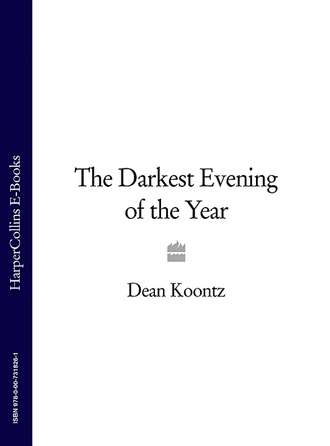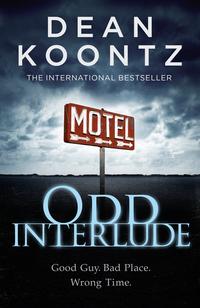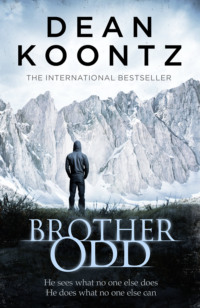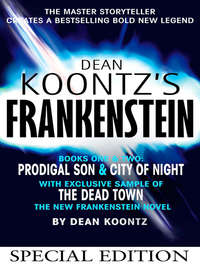
Полная версия
The Darkest Evening of the Year
Fred and Ethel did not bark, because they were trained not to speak without an important reason—such as a stranger at the door—and they were good dogs.
She most often took them with her. When she left them at home, they always greeted her return with an enthusiasm that lifted her heart.
Usually Ethel would appear first, ebullient and grinning, head raised, tail dusting the doorjamb as she came into the room.
She was a darker red-gold than Nickie, although well within the desirable color range for the breed. She had a thicker undercoat than usual for a retriever and looked gloriously furry.
Fred would probably follow Ethel. Not dominant, often bashful, he would be so thrilled to see Amy that he’d not only wag his tail furiously but also wiggle his hindquarters with irrepressible delight.
Sweet Fred had a broad handsome face and as perfectly black a nose as Amy had ever seen, not a speckle of brown to mar it.
At Amy’s side, Nickie stood alert, ears lifted, gaze fixed on the open hall door from which issued the muffled thunder of paws.
A sudden drop in the velocity of approach suggested that Fred and Ethel detected the presence of a newcomer. She checked her speed first, and Fred blundered into her as they came through the doorway.
Instead of the usual meet-and-greet, including nose to nose and tongue to nose and a courteously quick sniff of butts all around, the Redwing kids halted a few feet short of Nickie. They stood panting, plumed tails swishing, with cocked-head curiosity, eyes bright with what seemed like surprise.
Keeping her own tail in motion, Nickie raised her head, assuming a friendly but regal posture.
“Ethel sweetie, babycakes Fred,” Amy said in her sweet-talk voice, “come meet your new sister.”
Until she said “new sister,” she hadn’t known that she’d decided beyond doubt to keep Nickie rather than placing her with an approved family on the Golden Heart adoption list.
Previously, both kids had reliably been suckers for their master’s squeaky sweet-talk voice, but this time they ignored Amy.
Now Ethel did something she always did with a visiting dog but never until the meet-and-greet was concluded. She went to the open box of squeeze toys and pull toys and tennis balls inside the always-open pantry door, judiciously selected a prize, returned with it, and dropped it in front of the newcomer.
She had chosen a plush yellow Booda duck.
The message that Ethel usually managed to deliver with the loan of a toy to a visitor was this: Here’s one that’s exclusively yours for the length of your visit, but the rest belong to me and Fred unless we include you in a group game.
Nickie studied the duck for a moment, then regarded Ethel.
All the protocols were being revised: Ethel made a second trip to the box in the pantry and returned with a plush-toy gorilla. She dropped it beside the duck.
Meanwhile, Fred had circled the room to put the breakfast table between him and the two females. He lay on his belly, watching them through a chromework of chair legs, tail sweeping the oak floor.
If you are a dog lover, a true dog lover, and not just one who sees them as pets or animals, but are instead one who sees them as one’s dear companions, and more than companions—sees them as perhaps being but a step or two down the species ladder from human kind, not sharing human exceptionalism but not an abyss below it, either—you watch them differently from the way other people watch them, with a respect for their born dignity, with a recognition of their capacity to know joy and to suffer melancholy, with the certainty that they suspect the tyranny of time even if they don’t fully understand the cruelty of it, that they are not, as self-blinded experts contend, unaware of their own mortality.
If you watch them with this heightened perception, from this more generous perspective, as Amy had long watched them, you see a remarkable complexity in each dog’s personality, an individualism uncannily human in its refinement, though with none of the worst of human faults. You see an intelligence and a fundamental ability to reason that sometimes can take your breath away.
And on occasion, when you’re not being in the least sentimental, when you’re in too skeptical a mood to ascribe to dogs any human qualities they do not possess, you will nevertheless perceive in them that singular yearning that is common to every human heart, even to those who claim to live a faithless existence. For dogs see mystery in the world, in us and in themselves and in all things, and are at key moments particularly alert to it, and more than usually curious.
Amy recognized that this was such a moment. She stood quite still, said nothing, waited and watched, certain that forthcoming would be an insight that she would carry with her as long as she might live.
Having dropped the plush-toy gorilla beside the Booda duck, Ethel made a third trip to the toy box in the pantry.
Nickie peered at Fred, where he watched from behind a bulwark of chair legs.
Fred cocked his head to the left, cocked it to the right. Then he rolled onto his back, four legs in the air, baring his belly in an expression of complete trust.
In the pantry, Ethel bit at toys, tossed them aside, thrust her head deeper into the collection, and at last returned to Nickie with a large, plush, eight-tentacled, red-and-yellow octopus.
This was a squeaky toy, a tug toy, and a shake toy all in one. And it was Ethel’s favorite possession, off limits even to Fred.
Ethel dropped the octopus beside the gorilla, and after a moment of consideration, Nickie picked it up in her mouth. She squeaked it, shook it, squeaked it again, and dropped it.
Rolling off his back, scrambling to his feet, Fred sneezed. He padded out from behind the table.
The three dogs stared expectantly at one another.
Uniformly, their tail action diminished.
Their ears lifted as much as the velvety flaps of a golden are able to lift.
Amy became aware of a new tension in their muscular bodies.
Nostrils flaring, nose to the floor, head darting left and right, Nickie hurried out of the room, into the hall. Ethel and Fred scampered after her.
Alone in the kitchen, acutely aware that something unusual was happening but clueless as to what it meant, Amy said, “Kids?”
In the hallway, the overhead light came on.
When she crossed to the doorway, Amy found the hall deserted.
Toward the front of the house, somebody switched on a light in the living room. An intruder. Yet none of the dogs barked.
Chapter 9
Although Brian McCarthy had a talent for portraiture, he was not usually capable of swift execution.
The human head presents so many subtleties of form, structure, and proportion, so many complexities in the relationship of its features, that even Rembrandt, the greatest portrait painter of all time, struggled with his art and refined his craft until he died.
The head of a dog presented no less—and arguably a greater—challenge to an artist than did the human head. Many a master of their mediums, who could precisely render any man or woman, had been defeated in their attempts to portray dogs in full reality.
Remarkably, with this first effort at canine portraiture, sitting at his kitchen table, Brian found the speed that eluded him when he drew a human face. Decisions regarding form, structure, proportion, and tone did not require the ponderous consideration he usually brought to them. He worked with an assurance he had not known before, with a new grace in his hand.
The drawing appeared with such uncanny ease and swiftness that it almost seemed as if the whole image had been rendered earlier and stored magically in the pencil, from which it now flowed as smoothly as music from a recording.
During his courtship of Amy, his heart had been opened to many things, not least of all to the beauty and the joy of dogs, yet he still did not have one of his own. He didn’t trust himself to be equal to the responsibility.
At first he didn’t know that he was rendering not merely the ideal of a golden retriever but also a specific individual. As the face resolved in detail, he realized that from his pencils had come Nickie, so recently rescued.
He did not have more difficulty drawing eyes than he did any other detail of anatomy. This time, however, he achieved effects of line and tone and grading that continually surprised him.
To look real, the eyes must be full of light and marked by the mystery that light evokes in even the most forthright gaze. Brian focused with, for him, such unprecedented passion on the portrayal of this light, this mystery, that he might have been a medieval monk depicting the receiver of the Annunciation.
When he finished the drawing, he stared at it for a long time. Somehow the creation of the portrait had lifted his heart. Vanessa’s hateful e-mails had left him under a pall of sorrow, which now weighed less heavily on him.
Hope and Nickie seemed inextricably entwined, and he felt that he could not have one without the other. He did not know exactly what he meant by this—or why it should be so.
In the study once more, he composed an e-mail to Vanessa, alias pigkeeper. He read the message half a dozen times before sending it.
I am at your mercy. I have no power over you, and you have every power over me. If one day you will let me have what I want, that will be because it serves you best to relent, not because I have earned it or deserve it.
In previous e-mail exchanges, he had either argued with Vanessa or had attempted to manipulate her, although never as obviously as she worked to sharpen his guilt and to put a point on his sorrow. This time he avoided all appeals to reason and all power games, and just acknowledged his helplessness.
He expected neither an immediate response nor any response at all; and even if his plea elicited only vitriol, he would not reply in kind. Over the years, she had humbled him, then further humbled him, until he harbored no more anger toward her than a wizened sailor of a thousand journeys harbored resentment toward the raging sea.
In the kitchen, at the table, he turned to a fresh page in the art- paper tablet. He sharpened his pencils.
An inexplicable exhilaration had overcome him, a perception that new possibilities lay before him. He felt as if he were on the brink of a revelation that would change his life.
He began to draw the dog’s head, but this time not in a slight turn to the left with a moderate up view. Instead, he approached the subject straight on.
Furthermore, he intended to depict the face only from brow line to the part of the cheek called the cushion, thereby focusing on the eyes and the structures immediately surrounding them.
He marveled that his memory of the dog’s appearance should be so exquisitely detailed. He’d seen her only on one occasion and not for long, yet in his mind’s eye, she was as vivid as a fine photograph, a hologram.
From mind to hand to pencil to page, the golden’s gaze took form in shades of gray. From this new perspective and proximity, the eyes were huge and deep, and full of light, of shadow.
Brian was seeking something, a unique quality that he had seen in this dog but that he had not at once consciously recognized. His subconscious wanted now to bring forth what had been glimpsed, to see it rendered and to understand it.
A tremulous expectation filled him, but his hand remained steady and swift.
Chapter 10
Veils and shimmery flourishes of eye-deceiving moonlight render the night subtly surreal, yet the pride with which the owners maintain this property is everywhere evident.
The rails and posts and pales of the picket fence are white geometric perfection in the gloom. The lawn lies as even underfoot as a croquet court, lush but precisely mown.
The single-story house is humble yet handsome, white with a dark trim of some color not discernible. A simply carved cornice enhances the eaves and is echoed by window surrounds, no doubt fashioned by the homeowner in his spare time.
From the bentwood rocking chairs on the front and back porches, the birdbaths, the miniature windmill, and the garden gnomes, Harrow infers that the residents are near or past retirement age. The place feels like a nest meant for a long and well-earned rest.
He doubts that a single porch step or floorboard creaks, but he doesn’t risk treading on them. He pours the gasoline between the railings, first at the back porch, which looks out across fields and ancient oaks, and then at the front.
A thin drizzle of fuel across the grass connects the porches, and with the last contents of the can, he spills a fuse along the front walk toward the open gate in the picket fence.
While Moongirl waits for him at the safe end of the fuse, he returns to the house to set the empty utility can quietly on the porch. The still air hangs heavy with fumes.
He has dripped nothing on himself. As he walks away from the house, he cups his hands around his nose, and they smell fresh.
From a pocket of her leather jacket, Moongirl has extracted a box of matches. She uses only those with wooden stems.
She strikes a match, stoops, and ignites the wet trail on the walkway. Low blue-and-orange flames dance away from her, as if the magical night has brought forth a procession of capering faeries.
Together, she and Harrow walk to the west side of the house, where they have a view of both porches. The only doors are at the front and back. Along this wall are three windows.
Fire leaps high across the front of the house, seethes between the railings, and dispatches more dancing faeries along the drizzle that connects the porches.
As always, after an immediate whoosh, the flames initially churn in near silence, feeding on the gasoline, which needs no chewing. The crunch and crackle will come soon, when the fire takes wood in its teeth.
Chapter 11
Following the hallway to the living-room archway, Amy said, “Hello? Who’s there?”
Golden retrievers are not bred to be guard dogs, and considering the size of their hearts and their irrepressible joy in life, they are less likely to bite than to bark, less likely to bark than to lick a hand in greeting. In spite of their size, they think they are lap dogs, and in spite of being dogs, they think they are also human, and nearly every human they meet is judged to have the potential to be a boon companion who might, at any moment, cry “Let’s go!” and lead them on a great adventure.
Nevertheless, they have formidable teeth and are protective of family and home.
Amy assumed that any intruder who was able to induce three adult goldens to submit without one bark must be not foe but friend, or at least harmless. Yet she approached the living room with a curiosity that included a measure of wariness.
When Amy had answered Janet Brockman’s plea to rescue Nickie, she had not left Fred and Ethel in a dark house. One lamp in her bedroom and a brass reading lamp in the living room provided comfort.
Now the hallway ceiling fixture blazed. Also, ahead and to her right, the front room loomed brighter than she had left it.
When she passed the open bedroom door on her left and stepped through the living-room archway, she found no intruder, only three delighted dogs.
As any golden would do in a new environment, Nickie had gone exploring, chasing down the most interesting of all the new smells, weaving among chairs and sofas, mapping the landscape, identifying the coziest corners.
Filled with pride of home, Fred and Ethel followed the newcomer, pausing to note everything that she had noted, as if sharing with her had made the bungalow new again to them.
Sniffing, grinning, chuffing with approval, tails lashing, the new girl and her welcoming committee rushed past Amy.
By the time that she turned to follow them, they had vanished across the hall, into her bedroom. A moment ago, only a nightstand lamp had illuminated that room, but now the ceiling fixture burned bright.
“Kids?”
Matching plump sheepskin-covered dog beds mushroomed in two corners of the bedroom.
As Amy crossed the threshold, Nickie bumped a tennis ball with her nose, and Fred snatched it on the roll. Nickie checked out but didn’t want a plush blue bunny, so Ethel snared it.
The bedroom and the attached bath lacked an intruder, and by the time Amy followed the pack to the study, the fourth and last room in the bungalow, the ceiling light was on there, too.
Fred had dropped the ball, and Ethel had cast aside the bunny, and Nickie had decided not to stake a claim to a discarded pair of Amy’s socks that she had fished out of the knee space under the desk.
Paws thumping, nails clicking, tails knocking merrily against every crowding object, the dogs returned to the hall, then to the kitchen.
Puzzled, Amy went to the only window in the study and found it locked. Before leaving the room, she frowned at the wall switch and flipped it down, up, down, turning the ceiling fixture off, on, off.
She stood in the hall, listening to thirsty dogs lapping from the water bowls in the kitchen.
In the bedroom again, she checked both windows. The latches were engaged, as was the one in the bathroom.
She peered in the closet. No boogeyman.
The front-door deadbolt was locked. The security chain remained in place.
All three living-room windows were secure. With the dampers closed, no sinister Santa out of season could have come down the fireplace chimney to play games with the lights.
Behind her, she left on only the single nightstand lamp and the reading lamp in the living room. At the end of the hall, she stopped and looked back, but no gremlins had been at work.
In the kitchen, she found the three goldens lying on the floor, gathered around the refrigerator, heads raised and alert. They looked from her to the refrigerator, to her again.
Amy said, “What? You think it’s snack time—or am I going to find a severed head in the lettuce drawer?”
Chapter 12
Fire spawns fitful drafts in the still night, brief twists of hot wind that stir Harrow’s hair but dissipate behind him.
The people asleep in the house, if in fact anyone is at home, are strangers to Harrow. They have done nothing to him. They have done nothing for him, either.
They mean nothing to him.
He doesn’t know what they mean to Moongirl. They are strangers to her, as well, but they have some meaning for her. They are more to her than a mere medicine for boredom. He wonders what that might be.
Although curious, he will not ask her. He believes that he is safer if she thinks his understanding of her is complete, if she believes they are alike.
Flames engulf the back porch, and the sounds of consumption begin to arise from the front.
Moongirl’s hands are in the pockets of her black leather jacket. Her face remains expressionless. In her eyes is nothing more than a reflection of the fire.
Like her, Harrow has discipline of his intellect and of his body, but unlike her, he also has discipline of his emotions. Those are the three hallmarks of sanity.
Boredom is a state of mind akin to an emotion. Perhaps the emotion to which boredom most often leads is despair.
She seems too strong to be seriously discouraged by anything, yet she fights boredom with such reckless entertainments as this burning, which suggests that she dreads falling into an inescapable well of despair.
Laceworks of firelight flutter across the grass, and across Moon-girl, dressing her as if she is an unholy bride.
A light appears in the middle window.
Someone has awakened.
Sheer curtains deny a clear view, but judging by the murkiness of the light and by the amorphous shadows, smoke already roils in the room.
The house is pier-supported. Evidently, the flames writhed at once into the crawl space, a thousand bright tongues flickering, hissing poisonous fumes up through the floor.
Harrow thinks he hears a muffled shout, perhaps a name, but he cannot be certain.
Instinct, imperfect in the human species, will harry the rudely awakened residents toward the front door, then toward the back. They will find a deep wall of flames at either exit.
The moon seems to recede as the night grows bright. Fire wraps the corners of the house.
“We could have driven in another direction,” says Moongirl.
“Yes.”
“We could have found a different house.”
“Infinite choices,” he agrees.
“It doesn’t matter.”
“No.”
“It’s all the same.”
From inside, screaming arises, the shrill cry of a woman; and for sure, this time, a shout, the voice of a man.
“They thought they were different,” she says.
“But now they know.”
“They thought things mattered.”
“The way they took care of the house.”
“The carved cornice.”
“The miniature windmill.”
Now the character of the screaming changes from a cry of terror to shrieks of pain.
Sullen fire throbs inside, beyond the windows. The place has been tinder waiting to be lit.
Likewise, the people.
At the middle window, the sheer curtains vanish with a quick flare, like diaphanous sheets of flash paper between a magician’s fingertips.
In front of the house, the lonely two-lane road dwindles into darkness that even the dawn might not relieve.
Glass shatters outward, and a tormented figure appears at the middle window, in silhouette against the backdrop of the burning room. A man. He is shouting again, but the shout is half a scream.
Already the woman’s voice has been stifled.
The French panes do not allow an easy exit. The man struggles to twist open the lock, to raise the bottom sash.
Fire takes him. He falls back from the window, collapsing into the furnace that was once a bedroom, suffering into silence.
Moongirl asks, “What was he shouting?”
“I don’t know.”
“Shouting at us?”
“He couldn’t see us.”
“Then at who?”
“I don’t know.”
“He has no neighbors.”
“No.”
“No one to help.”
“No one.”
Heat bursts a window. Blisters of burning paint pop, pop, pop. Joints creak as nails grow soft.
“Are you hungry?” she asks.
“I could eat something.”
“We’ve got that good ham.”
“I’ll make sandwiches.”
“With the green-peppercorn mustard.”
“Good mustard.”
Spirals of flame conjure the illusion that the house is turning as it burns, like a carousel ablaze.
“So many colors in the fire,” she says.
“I even see some green.”
“Yes. There. At the corner. Green.”
Smoke ladders up the night, but nothing climbs it except more smoke, fumes on fumes, soot ascending soot, higher and higher into the sky.
Chapter 13
With breakfast and the morning walk only a couple of hours away, Amy would not let the gang of three panhandle cookies from her. “No fat dogs,” she admonished. In the refrigerator she kept a plastic bag of sliced carrots for such moments.
Sitting on the floor with the kids, she gave circles of crisp carrot first to Ethel, then to Fred, then to Nickie. They crunched the treats enthusiastically and licked their chops.
When she had given each of them six pieces, she said, “Enough. We don’t want you to have bright orange poop, do we?”
She borrowed a dog bed from the study and put it in a third corner of her bedroom, and filled a second water dish to put beside the first.
By the time Amy changed into pajamas, the dogs appeared to have settled in their separate corners for what remained of the night.







